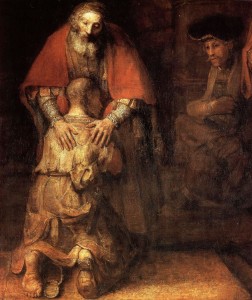Jesus said, “There was a rich man who was dressed in purple and fine linen and who feasted sumptuously every day. And at his gate lay a poor man named Lazarus, covered with sores, who longed to satisfy his hunger with what fell from the rich man’s table; even the dogs would come and lick his sores.” (Luke16:19)
I have been meeting Lazarus in the streets. The biblical description is quite accurate. Most of the homeless have dogs as pets. The dogs are their companions and they also protect their owners from danger. They are in many ways their only friends. The homeless keep their dogs well-fed. It is strange but many times the dogs look better than their owners. I haven’t seen the rich man around until this past Tuesday. I met him face to face.
It was an usual day. We went to the streets and we began our work with prayer. In our time of silent prayer, I contemplated on this gospel text and then it dawned upon me: I am the rich man. When we are among the poorest of the poor, most of us are the rich man. The rich man in the parable is not the other person, but it is me.
Some times people like to say that we are blessed to have material possessions. I am not sure if blessed is the right word. In the parable, the rich man’s wealth led him to hell. Lazarus was just a poor man who had nothing and was a nobody in society and yet, he found himself in Abraham’s bosom. According to the gospel, Lazarus was really the blessed one (the evangelical paradox in action). Jesus did say, “Blessed are you poor for yours is the kingdom of God.”(Luke 6:20) Interestingly, there is no reference in the New Testament that claims that the rich are blessed.
Among the poor, I am the rich man. I am not well off or blessed. I am not even one step away from poverty. I can choose to be poor because I am a rich man. The parable is a warning for me to consider carefully how I should use the things given to me. They do not belong to me. They belong to God. They are given to us to understand the mystery of salvation. Many think that when we help the poor, we need to change their condition. God does not expect us to change anyone’s situation but He expects us to bring comfort to those who suffer.
We met a young teenager in the streets that was hurt in a car accident. Her right arm was seriously burnt and her bone was exposed. I do not have the words to describe the nature of her injury. She needed to be in the hospital but she was in the streets. The bandage on her arm was old and dirty. She asked if we would help her dress her wounds. However, she refused to let us do it. Her arm hurt too much and she was afraid that we might be rough with her. We just stood there and watched her slowly peel off the old and dirty gauze. She needed to be in the hospital but she refused to go. She was afraid. She was alone. We just stood there and watched her dress her wounds. We felt helpless but at the end she thanked us for just being there and giving her the attention. We felt helpless but somehow our presence comforted this girl. She did not want any medical attention. She did not expect us heal her or change her situation. She had simple expectations. She just needed some adults to be present with her. It was comforting for her.
This was what God expected the rich man to do. He wanted him to comfort Lazarus in his suffering. However, the parable is not about just being a good neighbor. It is about salvation. A missionary who has been working among the homeless and sex workers for 9 years shared that the mystery of salvation became clearer when she served “Lazarus” in the streets. It is not about working for our salvation. Today in the church, we hardly meet people who are working towards salvation. However, most of us can become like the rich man in the parable who is oblivious to the world around him. Lazarus was there to help him understand the mystery of salvation but he failed to see this. We need Lazarus as much as he needs us to understand our salvation. Salvation is a gift and a gift must be appreciated: if not, it’s meaning can be lost forever for us.


